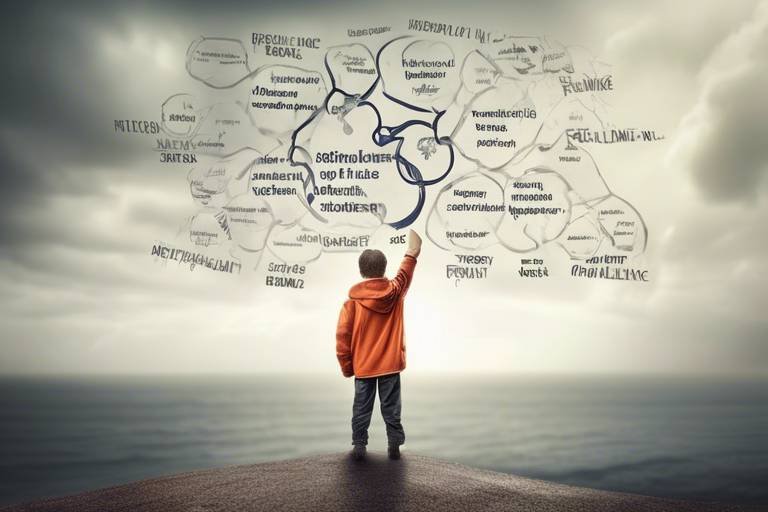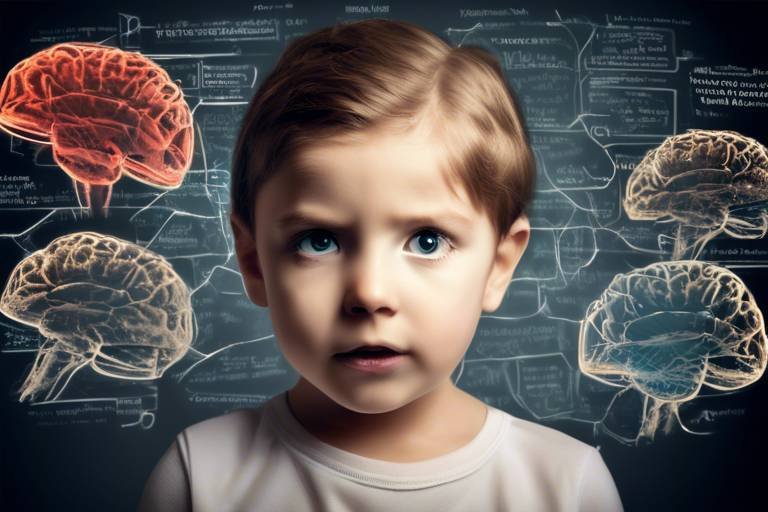Exploring the Science of Emotional Intelligence
Emotional intelligence (EI) is a fascinating concept that has gained significant traction in both personal and professional realms. Imagine being able to navigate through the complexities of human emotions with the same ease as a skilled sailor navigating through turbulent waters. That’s what emotional intelligence allows us to do—it equips us with the tools to understand not just our own feelings but also the feelings of those around us. In a world where emotional interactions are as common as the air we breathe, honing our EI can make a remarkable difference in the quality of our relationships and overall well-being.
But what exactly is emotional intelligence? At its core, EI refers to the ability to recognize, understand, and manage our emotions, as well as the emotions of others. Think of it as having a finely tuned emotional radar that helps you detect and respond to the emotional climate of any situation. It transcends mere intellectual ability and dives deep into the realm of emotional awareness. This is crucial because emotions can significantly influence our decisions, behaviors, and interactions. The better we are at managing our emotions, the more effectively we can communicate and connect with others.
Research has shown that individuals with high emotional intelligence tend to be more successful in their personal and professional lives. They are often more adaptable, resilient, and able to handle stress and conflict with grace. Whether it’s resolving a disagreement with a colleague or comforting a friend in distress, those who possess strong EI skills are typically the ones who can navigate these situations smoothly. It’s not just about being nice; it’s about understanding the nuances of human emotions and using that understanding to foster deeper connections and better outcomes.
In this article, we will delve deeper into the components of emotional intelligence, its importance, and practical strategies for enhancing our EI. By the end, you’ll not only understand the science behind emotional intelligence but also how to apply it in your everyday life. So, are you ready to embark on this journey of emotional discovery? Let’s dive in!

Understanding Emotional Intelligence
Emotional intelligence (EI) is more than just a buzzword; it's a vital skill set that influences how we interact with the world around us. At its core, EI encompasses the ability to recognize, understand, and manage both our own emotions and the emotions of others. Imagine walking into a room and sensing the mood instantly—whether it's tension, joy, or confusion. That’s emotional intelligence in action. It allows us to navigate social complexities with grace and empathy.
The concept of emotional intelligence was popularized by psychologist Daniel Goleman, who identified it as a key factor in personal and professional success. But why is it so significant? Well, think of emotional intelligence as the glue that holds our relationships together. It enables us to build trust, resolve conflicts, and communicate effectively. Without it, our interactions can become strained and misunderstandings can easily arise.
EI is typically broken down into five core components: self-awareness, self-regulation, motivation, empathy, and social skills. Each of these elements plays a crucial role in how we perceive ourselves and relate to others. For instance, self-awareness allows us to understand our emotional triggers, while empathy helps us connect on a deeper level with those around us.
To illustrate this, consider a workplace scenario: a colleague is upset about a project setback. A person with high emotional intelligence would not only recognize their colleague's distress but also approach them with understanding and support. In contrast, someone lacking in EI might dismiss the colleague's feelings, potentially leading to further conflict and resentment.
Ultimately, emotional intelligence is not just about being sensitive to others; it's about enhancing our own emotional well-being and fostering healthier relationships. It’s a skill that can be cultivated and improved over time, making it an essential focus for anyone looking to enhance their personal and professional life.
In summary, understanding emotional intelligence is the first step toward harnessing its power. By developing our EI, we can improve our interactions, make better decisions, and lead more fulfilling lives.

The Importance of Emotional Intelligence
Emotional intelligence (EI) is not just a buzzword; it’s a vital skill that shapes our interactions and overall well-being. Imagine navigating through life without the ability to understand your own feelings or those of others. It would be like trying to drive a car with a blindfold on—dangerous and chaotic! In today’s fast-paced world, where communication is key, having a high EI can be the difference between thriving in your personal and professional life or simply getting by.
One of the most significant advantages of emotional intelligence is its impact on relationships. Whether it’s with family, friends, or colleagues, EI allows us to connect on a deeper level. When you can empathize with someone’s feelings, you’re not just hearing their words; you’re tuning into their emotional frequency. This kind of connection fosters trust and understanding, often leading to more meaningful interactions. Think about it: wouldn’t you prefer to engage with someone who genuinely understands your emotions rather than someone who seems indifferent?
Moreover, emotional intelligence is crucial for effective communication. It’s not just about what you say, but how you say it. A person with high EI can tailor their communication style to suit the emotional state of their audience. For instance, if a colleague is feeling overwhelmed, an emotionally intelligent person can approach the conversation with empathy, offering support rather than criticism. This adaptability can lead to more productive discussions and a more harmonious work environment.
In the workplace, the implications of emotional intelligence are profound. Studies have shown that teams with high EI tend to perform better and are more cohesive. They handle conflicts more effectively and are better at problem-solving. This is because emotionally intelligent individuals can navigate their own emotions and those of others, leading to fewer misunderstandings and a more positive atmosphere. In fact, a recent survey indicated that companies prioritize emotional intelligence when hiring, recognizing its role in fostering a successful workplace culture.
Furthermore, emotional intelligence contributes significantly to personal success. Individuals with high EI are often more resilient, able to bounce back from setbacks with greater ease. They possess a strong sense of motivation that drives them to pursue their goals, even in the face of adversity. This resilience is largely due to their ability to regulate their emotions, allowing them to maintain focus and composure during challenging times.
To sum it up, the importance of emotional intelligence can be encapsulated in the following key points:
- Enhances Relationships: Builds deeper connections through empathy and understanding.
- Improves Communication: Tailors interactions to the emotional states of others, fostering better dialogue.
- Boosts Workplace Performance: Creates cohesive teams that handle conflicts effectively.
- Promotes Personal Success: Encourages resilience and motivation to achieve goals.
As we see, emotional intelligence is not merely an accessory to our skill set; it’s an essential component of a fulfilling life. It empowers us to understand and manage our emotions while also being sensitive to the feelings of others. In a world where emotional connections often dictate the quality of our interactions, honing our emotional intelligence is not just beneficial—it’s imperative.

Components of Emotional Intelligence
Emotional intelligence (EI) is a multifaceted concept that encompasses several key components, each playing a vital role in how we navigate our emotions and interact with others. Understanding these components is essential for anyone looking to enhance their emotional skills and foster better relationships. The five core components of emotional intelligence are self-awareness, self-regulation, motivation, empathy, and social skills. Let’s break these down and see how they contribute to our emotional landscape.
Self-awareness is the foundation of emotional intelligence. It involves recognizing your own emotions and understanding how they influence your thoughts and behaviors. When you're self-aware, you can identify your emotional triggers and patterns, which empowers you to respond rather than react impulsively. For example, if you notice that you become anxious before a big presentation, you can take steps to manage that anxiety rather than letting it overwhelm you. Techniques such as journaling or mindfulness meditation can greatly enhance your self-awareness, allowing you to reflect on your emotional state and its impact on your life.
Next is self-regulation, which refers to the ability to control your emotions and impulses. This skill is crucial in maintaining composure, especially in stressful situations. Imagine being in a heated meeting where tensions run high; a person with strong self-regulation can remain calm, think clearly, and respond thoughtfully rather than letting anger dictate their actions. Practicing techniques like deep breathing or pausing before responding can help improve self-regulation, allowing for more measured reactions in challenging scenarios.
Motivation in the context of emotional intelligence goes beyond mere ambition. It’s about having a passion for what you do and a commitment to personal and professional growth. Motivated individuals tend to have a positive outlook, which can be infectious in team settings. They are often driven by intrinsic rewards, such as a sense of accomplishment or the joy of helping others. Cultivating motivation can involve setting personal goals, celebrating small wins, and surrounding yourself with supportive individuals who inspire you to push your boundaries.
Empathy is perhaps one of the most recognized components of emotional intelligence. It involves the ability to understand and share the feelings of others. Empathy is not just about feeling sorry for someone; it’s about putting yourself in their shoes and grasping their emotional experiences. This skill is invaluable in both personal and professional relationships, as it fosters connection and trust. For instance, a manager who practices empathy can better understand the challenges their team faces, leading to a more supportive and productive work environment. Techniques to enhance empathy include active listening and engaging in open conversations about feelings and experiences.
Lastly, we have social skills, which encompass a range of abilities that facilitate effective communication and relationship-building. Strong social skills enable individuals to navigate social complexities, resolve conflicts, and inspire others. Whether it’s through verbal communication, body language, or emotional cues, those with high emotional intelligence can create rapport and foster collaboration. Engaging in team activities, practicing assertiveness, and being open to feedback are excellent ways to hone your social skills.
In summary, the components of emotional intelligence—self-awareness, self-regulation, motivation, empathy, and social skills—are interconnected and essential for personal development and effective interpersonal interactions. By focusing on these areas, individuals can significantly enhance their emotional intelligence, leading to improved relationships and overall well-being.
- What is emotional intelligence? Emotional intelligence is the ability to recognize, understand, and manage our own emotions and the emotions of others.
- Why is emotional intelligence important? It plays a crucial role in fostering healthy relationships, effective communication, and personal success.
- Can emotional intelligence be developed? Yes, emotional intelligence can be improved through self-reflection, practice, and feedback.
- What are some practical ways to enhance emotional intelligence? Techniques include mindfulness practices, seeking feedback, and engaging in self-reflection.

Self-Awareness
Self-awareness is often hailed as the cornerstone of emotional intelligence. It’s that magical ability to recognize and understand your own emotions, thoughts, and behaviors, and how they influence your interactions with the world around you. Imagine standing in front of a mirror, not just seeing your reflection, but truly understanding the emotions behind that face staring back at you. This profound level of insight allows you to navigate life with greater clarity and purpose.
But why is self-awareness so crucial? Well, think of it as the GPS for your emotional journey. Without it, you might find yourself lost in a maze of feelings, unable to determine which path to take. Being self-aware helps you identify your emotional triggers, understand your strengths and weaknesses, and recognize how your emotions affect your decision-making and relationships.
To enhance self-awareness, consider these effective techniques:
- Journaling: Writing down your thoughts and feelings can help you process emotions and gain insights into your behavior patterns.
- Mindfulness Meditation: Practicing mindfulness allows you to observe your emotions without judgment, fostering a deeper understanding of your emotional landscape.
- Seeking Feedback: Asking trusted friends or colleagues for their perspectives on your behavior can provide valuable insights that you might not see yourself.
Research shows that individuals with high self-awareness tend to be more confident and effective in their personal and professional lives. They are better at managing stress, making informed decisions, and cultivating meaningful relationships. In contrast, a lack of self-awareness can lead to misunderstandings, conflict, and a host of emotional challenges.
So, how can you start this journey towards greater self-awareness? Begin by carving out a few moments each day for self-reflection. Ask yourself questions like: What emotions am I feeling right now? How do these emotions affect my behavior? What can I learn from this experience? Over time, these practices can transform your relationship with yourself and enhance your emotional intelligence.
In summary, self-awareness is not just about knowing yourself; it's about understanding how your emotions shape your experiences and interactions. By investing time in developing this skill, you’re not only improving your emotional intelligence but also paving the way for a more fulfilling and connected life.
- What are the benefits of self-awareness? Self-awareness leads to better decision-making, improved relationships, and enhanced emotional regulation.
- How can I practice self-awareness daily? Engage in journaling, mindfulness meditation, and seek feedback from others.
- Is self-awareness a skill that can be developed? Absolutely! With consistent practice and reflection, anyone can enhance their self-awareness.

Empathy
Empathy is more than just a buzzword; it’s a vital component of emotional intelligence that allows us to connect with others on a profound level. Imagine walking a mile in someone else's shoes—feeling their joy, pain, and everything in between. This ability to understand and share the feelings of others not only enhances our personal relationships but also enriches our professional interactions. When we practice empathy, we create a bridge of understanding that fosters trust and compassion.
In our fast-paced world, where everyone seems to be rushing from one task to another, taking the time to truly listen and understand someone else’s perspective can feel like a rarity. However, empathy is essential for building strong relationships, whether at home, at work, or in the community. It allows us to recognize the emotions of others, respond appropriately, and create an environment where everyone feels valued and understood.
So, how do we cultivate empathy in our daily lives? Here are a few practical strategies:
- Active Listening: This means giving your full attention to the speaker, making eye contact, and refraining from interrupting. Show that you value their words and emotions.
- Ask Open-Ended Questions: Encourage others to share their feelings by asking questions that require more than a yes or no answer. This invites deeper conversation.
- Practice Perspective-Taking: Challenge yourself to see situations from another person's viewpoint. This can be especially helpful in conflict resolution.
Empathy also plays a critical role in effective communication. When we empathize with others, we are more likely to respond with understanding and kindness, rather than judgment. This not only helps to diffuse tense situations but also encourages a collaborative atmosphere where ideas can flourish. In the workplace, for instance, leaders who demonstrate empathy can inspire their teams, leading to increased morale and productivity.
Research has shown that empathy can even have physiological benefits. When we engage in empathetic behaviors, our brains release oxytocin, often referred to as the "love hormone." This hormone promotes feelings of bonding and trust, which can enhance our emotional well-being. It's like a warm hug for our hearts and minds!
In conclusion, empathy is an essential skill that can transform our interactions and relationships. By actively practicing empathy, we not only improve our emotional intelligence but also contribute to a more compassionate and understanding world. So, the next time you find yourself in a conversation, ask yourself: how can I better understand this person's experience? You might be surprised at the connections you can build.
- What is the difference between empathy and sympathy? Empathy involves understanding and sharing the feelings of others, while sympathy is feeling pity or sorrow for someone else's misfortune without necessarily understanding their emotions.
- Can empathy be learned? Yes, empathy is a skill that can be developed through practice and self-reflection. Engaging in active listening and perspective-taking are effective ways to enhance empathetic abilities.
- Why is empathy important in the workplace? Empathy fosters a positive work environment, improves communication, and enhances teamwork. It helps build trust and encourages collaboration among colleagues.

Applications of Emotional Intelligence
Emotional intelligence (EI) is not just a buzzword; it’s a vital skill set that has profound implications across various fields. Whether you’re in education, business, or healthcare, understanding and applying emotional intelligence can lead to enhanced performance and better collaboration. Think of EI as the secret ingredient in a recipe; it’s what elevates a good dish to a great one. Let’s dive into how EI manifests in these critical areas of our lives.
In the realm of education, emotional intelligence is essential for both teachers and students. Educators with high EI can create a more supportive and engaging learning environment. They are adept at recognizing the emotional states of their students, which allows them to tailor their teaching methods accordingly. For instance, a teacher who senses that a student is anxious about an upcoming exam can provide additional support or resources to ease that stress. This not only fosters a positive classroom atmosphere but also encourages student success.
Moreover, students equipped with emotional intelligence are better at managing their own emotions and navigating social challenges. They tend to have improved academic performance and are more likely to engage in collaborative learning experiences. Ultimately, cultivating EI in educational settings can lead to a more holistic approach to student development.
In the business world, emotional intelligence is a game-changer. Leaders with high EI can inspire and motivate their teams, fostering a culture of trust and open communication. When employees feel understood and valued, they are more likely to be engaged and productive. For instance, a manager who practices active listening can better address team concerns, leading to higher morale and lower turnover rates. This is crucial in today’s fast-paced work environment where collaboration is key.
Furthermore, emotional intelligence enhances conflict resolution skills. In any workplace, disagreements are inevitable. However, individuals with strong EI can navigate these conflicts with empathy and understanding, leading to more constructive outcomes. They can see the situation from multiple perspectives and find common ground, ultimately benefiting the organization as a whole.
In the field of healthcare, emotional intelligence is equally important. Healthcare professionals who exhibit high EI can connect with patients on a deeper level, which is essential for effective treatment. A nurse who can empathize with a patient’s fear or discomfort can provide reassurance and support that significantly improves the patient experience. Likewise, doctors who practice emotional intelligence can better understand their patients’ needs, leading to more personalized care.
To illustrate the application of emotional intelligence across these fields, let’s take a look at the following table:
| Field | Application of EI | Benefits |
|---|---|---|
| Education | Creating supportive learning environments | Improved student engagement and performance |
| Business | Enhancing team collaboration and morale | Increased productivity and lower turnover |
| Healthcare | Building patient-provider relationships | Better patient satisfaction and outcomes |
In summary, the applications of emotional intelligence are vast and impactful. Whether in a classroom, a boardroom, or a hospital, EI facilitates better interactions and fosters environments where individuals can thrive. It’s not just about being smart; it’s about being emotionally aware and connected. So, the next time you find yourself in a challenging situation, remember that emotional intelligence can be your guiding light.
Q1: What is emotional intelligence?
A1: Emotional intelligence is the ability to recognize, understand, and manage our own emotions and the emotions of others. It encompasses skills like self-awareness, empathy, and effective communication.
Q2: How can I improve my emotional intelligence?
A2: You can enhance your emotional intelligence through mindfulness practices, seeking feedback from others, and engaging in self-reflection to better understand your emotional responses.
Q3: Why is emotional intelligence important in the workplace?
A3: High emotional intelligence in the workplace leads to improved collaboration, better conflict resolution, and a more positive organizational culture, ultimately enhancing productivity and employee satisfaction.
Q4: Can emotional intelligence be developed over time?
A4: Yes, emotional intelligence can be developed through practice and self-awareness. It’s a lifelong journey that involves continuous learning and adaptation.

Developing Emotional Intelligence
Improving emotional intelligence (EI) is not just a one-time effort; it's a lifelong journey filled with self-discovery and growth. Think of it as tuning a musical instrument—regular adjustments and practice are essential to keep it in harmony. The good news is that anyone can enhance their EI with the right strategies and a willingness to learn. So, how do we embark on this transformative path?
First and foremost, self-reflection plays a pivotal role in the development of emotional intelligence. By taking the time to reflect on our emotional responses to various situations, we can gain valuable insights into our feelings and behaviors. This practice can be as simple as journaling about your day and noting moments when your emotions were particularly strong. Ask yourself questions like: What triggered this emotion? How did I respond? What could I have done differently? Such reflections can illuminate patterns in our emotional responses and help us understand ourselves better.
In addition to self-reflection, actively seeking feedback from others can be incredibly beneficial. Often, we are blind to our own behaviors and how they affect those around us. By asking trusted friends, family, or colleagues for their perspectives on our emotional responses and interactions, we can uncover blind spots and areas for improvement. Remember, constructive criticism is a gift, so approach it with an open mind and a willingness to grow.
Moreover, integrating mindfulness practices into your daily routine can significantly enhance your emotional intelligence. Mindfulness encourages us to be present in the moment and aware of our thoughts and feelings without judgment. Techniques such as meditation, deep breathing exercises, or even mindful walking can help cultivate a greater awareness of our emotional states. For instance, when you feel overwhelmed, taking a few minutes to breathe deeply and focus on your breath can create a sense of calm and clarity, allowing you to respond more thoughtfully rather than react impulsively.
To illustrate the benefits of mindfulness, consider the following table that outlines some effective mindfulness practices:
| Mindfulness Practice | Description | Benefits |
|---|---|---|
| Meditation | Focused breathing and thought observation. | Improves self-awareness and emotional regulation. |
| Deep Breathing | Consciously inhaling and exhaling to calm the mind. | Reduces stress and increases emotional control. |
| Mindful Walking | Walking while paying attention to your surroundings and sensations. | Enhances awareness and promotes relaxation. |
Lastly, remember that developing emotional intelligence is not a sprint; it’s a marathon. It requires patience and continuous effort. Surround yourself with supportive individuals who encourage your growth and challenge you to be better. Engage in discussions about emotions, listen actively, and practice empathy. By fostering an environment that prioritizes emotional intelligence, you not only enhance your own skills but also contribute to a more emotionally intelligent community.
- What is emotional intelligence? Emotional intelligence is the ability to recognize, understand, and manage our own emotions and those of others.
- Can emotional intelligence be developed? Yes, emotional intelligence can be improved through self-reflection, seeking feedback, and practicing mindfulness.
- Why is emotional intelligence important? It helps in building strong relationships, effective communication, and overall personal and professional success.

Mindfulness Practices
In our fast-paced world, where distractions are just a click away, have emerged as a powerful tool for enhancing emotional intelligence. Mindfulness is all about being present in the moment, fully engaging with our thoughts and feelings without judgment. It’s like hitting the pause button on life’s chaos, allowing us to tune into our inner selves and the emotions swirling around us. By incorporating mindfulness into our daily routines, we can significantly improve our self-awareness and emotional regulation, which are crucial components of emotional intelligence.
One of the simplest yet most effective mindfulness practices is breath awareness. This technique involves focusing solely on your breath—how it feels as you inhale and exhale. It’s astonishing how something so simple can ground you and bring clarity to your thoughts. Just a few minutes of breath awareness can help you recognize when your emotions are starting to escalate, giving you the opportunity to respond rather than react. Imagine being in a heated discussion and, instead of letting frustration take over, you take a moment to breathe deeply. This pause can transform the conversation and lead to a more constructive outcome.
Another practice to consider is mindful observation. This involves choosing an object, whether it’s a flower, a piece of art, or even a cup of coffee, and observing it intently. Notice the colors, textures, and shapes without rushing to label or judge. This practice not only enhances your ability to focus but also encourages a non-judgmental attitude towards your thoughts and feelings. You might find that this practice spills over into your interactions with others, fostering a greater sense of empathy and understanding.
Incorporating mindfulness into your life doesn’t have to be time-consuming. Even small, intentional moments throughout the day can make a difference. For instance, you can practice mindfulness while walking, eating, or even during mundane tasks like washing the dishes. The key is to bring your full attention to the activity at hand. When you eat, savor each bite and notice the flavors and textures; when you walk, feel the ground beneath your feet and the air on your skin. These moments of presence can enhance your emotional regulation, allowing you to respond to situations with greater calmness and clarity.
To help you get started, here’s a simple table outlining various mindfulness practices and their benefits:
| Mindfulness Practice | Benefits |
|---|---|
| Breath Awareness | Enhances self-awareness and emotional regulation. |
| Mindful Observation | Improves focus and cultivates a non-judgmental mindset. |
| Walking Meditation | Promotes relaxation and mindfulness in motion. |
| Mindful Eating | Encourages appreciation of food and awareness of hunger cues. |
In conclusion, the journey to enhancing your emotional intelligence through mindfulness practices is not just about learning new techniques—it's about transforming your relationship with yourself and others. As you develop these practices, you’ll find that your ability to navigate emotions—both yours and those of others—will improve significantly. Remember, the path to emotional intelligence is a marathon, not a sprint. Embrace the journey, and you’ll reap the rewards of deeper connections and a more fulfilling life.
- What is emotional intelligence? Emotional intelligence refers to the ability to recognize, understand, and manage our own emotions as well as the emotions of others.
- How can mindfulness improve emotional intelligence? Mindfulness enhances self-awareness and emotional regulation, which are key components of emotional intelligence.
- Can mindfulness practices be incorporated into a busy lifestyle? Yes! Mindfulness can be practiced in short moments throughout the day, making it accessible even for those with hectic schedules.
- How long should I practice mindfulness each day? Even just a few minutes of mindfulness can be beneficial. Start small and gradually increase the time as you become more comfortable with the practice.

Feedback and Reflection
Feedback and reflection are two powerful tools that can significantly enhance your emotional intelligence. Think of feedback as a mirror, reflecting not just your actions but also the impact they have on others. When you actively seek feedback, you open the door to understanding how your emotions and behaviors resonate with those around you. It’s like tuning a musical instrument; without regular adjustments based on what you hear, you might end up playing out of tune. But how do you effectively gather and utilize feedback?
One effective method is to create a safe space for open dialogue. This means approaching colleagues, friends, or family members and encouraging them to share their honest thoughts about your emotional responses and interactions. You might ask questions such as:
- How do you feel when I respond to stress?
- Do you think I listen well when you share your concerns?
- Can you give me an example of a time when I could have handled a situation better?
These questions not only invite constructive criticism but also show that you value the perspectives of others. However, it’s essential to approach feedback with an open mind. Remember, it’s not about defending yourself but about understanding how you can grow.
Reflection complements feedback beautifully. After receiving insights from others, take time to process this information. Reflect on your emotional reactions and consider the following:
- What patterns do I notice in the feedback?
- Are there recurring themes in how others perceive my emotional responses?
- How can I apply this feedback to future interactions?
Journaling can be an excellent practice for reflection. By writing down your thoughts and feelings about specific interactions, you can track your emotional growth over time. It’s like keeping a diary of your emotional journey, allowing you to look back and see how far you’ve come. Additionally, consider setting aside a few minutes each day to reflect on your emotional responses. Ask yourself questions like, “What triggered my emotions today?” or “How did I manage my feelings in that situation?”
Incorporating feedback and reflection into your routine can lead to profound changes in your emotional intelligence. It’s a continuous cycle of learning, adapting, and growing. So, the next time someone offers you feedback, embrace it as a golden opportunity for self-discovery and improvement. After all, enhancing your emotional intelligence isn't just about understanding yourself better; it's about enriching your relationships and creating a more empathetic world.
- What is emotional intelligence? Emotional intelligence is the ability to recognize, understand, and manage our own emotions, as well as the emotions of others.
- Why is emotional intelligence important? It plays a crucial role in fostering healthy relationships, effective communication, and personal success.
- How can I improve my emotional intelligence? You can enhance your emotional intelligence through self-awareness, empathy, mindfulness practices, and seeking feedback.
- What are some techniques for self-reflection? Journaling, meditation, and asking for constructive feedback are effective techniques for self-reflection.
Frequently Asked Questions
- What is emotional intelligence?
Emotional intelligence (EI) is the ability to recognize, understand, and manage our own emotions, as well as the emotions of others. It plays a crucial role in how we interact with others and navigate social complexities.
- Why is emotional intelligence important?
Emotional intelligence is vital because it enhances our communication skills, improves relationships, and contributes to personal and professional success. It helps us to empathize with others and manage conflicts more effectively.
- What are the main components of emotional intelligence?
The core components of emotional intelligence include self-awareness, self-regulation, motivation, empathy, and social skills. Each of these elements contributes to how we understand and interact with ourselves and those around us.
- How can I improve my emotional intelligence?
Improving emotional intelligence is a lifelong journey. You can enhance your EI by practicing mindfulness, seeking feedback from others, engaging in self-reflection, and actively working on your empathy and social skills.
- What role does empathy play in emotional intelligence?
Empathy is a key component of emotional intelligence. It allows us to understand and share the feelings of others, which is essential for building strong relationships and fostering effective communication.
- Can emotional intelligence be developed over time?
Absolutely! Emotional intelligence can be developed and refined through consistent practice, self-reflection, and a willingness to learn from experiences and feedback.
- How does emotional intelligence affect professional relationships?
In the workplace, emotional intelligence can lead to better teamwork, improved leadership, and enhanced conflict resolution. It helps individuals to navigate social dynamics and work collaboratively towards common goals.
- What are some mindfulness practices to enhance emotional intelligence?
Mindfulness practices such as meditation, deep breathing exercises, and journaling can significantly enhance emotional intelligence. These techniques promote self-awareness and emotional regulation, making it easier to manage feelings and reactions.
- How can I seek feedback to improve my emotional intelligence?
To seek feedback, approach trusted friends, family, or colleagues and ask for their honest opinions about your emotional reactions and interactions. Be open to constructive criticism and use it as a tool for growth.



















